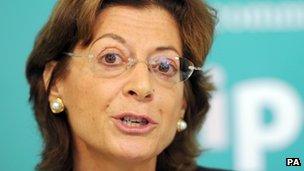IPCC advised to take soft tone with police
- Published

Deborah Glass sent an email advising a soft approach be taken with police suspects
The deputy chair of the Independent Police Complaints Commission (IPCC) cautioned one of their senior investigators against treating police as possible suspects in investigating a man's death during an arrest.
An email sent by Deborah Glass warns against putting officers on notice that they are under investigation, which can be the first step to criminal charges.
A lawyer for the man's family said the IPCC placed good relations with police ahead of its public duty to investigate potentially criminal police failings.
Details of the internal email come as parliament's Home Affairs Select Committee conducts an inquiry into the IPCC.
The email from Ms Glass, which was sent to the lead investigator and the commissioner in charge of the investigation, relates to the death of Habib Ullah in July 2008 as he was restrained while being arrested by Thames Valley police.
Mr Ullah, a 39-year-old known drug user, was involved in a seven-minute struggle with police in High Wycombe on the night of his attempted arrest after officers witnessed him swallowing a bag of drugs. He died at the scene.
Inquest abandoned
Despite the family's concern over the amount of force used by police, the IPCC did not interview the officers involved, but allowed them to submit written statements instead.
In March 2010, the IPCC cleared the officers of any wrongdoing.
But under oath at the subsequent inquest in December 2010, the officers admitted to removing potentially key evidence from their written statements to the IPCC claiming they were told to do so by a police federation lawyer.
Mr Ullah's family believes the information withheld showed that he was in serious distress and was designed to throw IPCC investigators off the scent.
The revelations at the inquest led to it being abandoned so that the IPCC could further investigate the officers involved. The four police officers in the case are now part of a manslaughter investigation.
The Police Federation told BBC Panorama it would not comment on the allegations arising out of the inquest because of the ongoing investigation. The lawyer involved denies any wrong doing.
While the IPCC did have the power at the time of their initial investigation to compel the officers to be interviewed under oath, Ms Glass' email to the lead investigator said: "They (the police) have been very co-operative to date on the basis that the IPCC has treated them as witnesses."
Ms Glass wrote that if they felt they were "being treated as suspects in a suspicious death... this could cause the officers to withdraw co-operation... with the real possibility that in future incidents, officers will be much more reluctant to co-operate with our investigators".
She advised, "handling this very carefully if you don't want the barriers to go up".
The officers were subsequently put on notice they were being investigated but they were never interviewed by the IPCC under criminal caution.
Ms Glass said the email in question was not a warning and has been taken out of context: "It was sent to the commissioner responsible for the case, and contained neither instructions nor any direction. It provided background information about what had happened in some previous cases involving serving of notices, both where they were and were not served, and comments on the effect of the service of notices in particular on delays and provision of information."
Families dissatisfied
Jules Carey, the lawyer representing the Ullah family, said: "It is an example of the IPCC getting it very, very wrong.
"Victims of police misconduct need to believe that those responsible for investigating will investigate robustly. And police forces, I don't believe, have that concern."
In a statement in response to Panorama, IPCC chair Dame Anne Owers said it was calling for more powers to compel officers to attend interviews.
Dame Anne added: "We are currently carrying out a thorough and robust criminal investigation in the case of Habib Ullah, after facts emerged at inquest under oath which had not previously been admitted to us."
Regarding the Deborah Glass email, Dame Anne's statement said that in a previous case interviewing officers under notice that they were being investigated had led to a "wall of silence". She added that, in the "Ullah case, detailed statements had already been taken from the officers" and on the basis of this they were served with a notice that they were under investigation.
Mr Ullah's cousin, Zia Ullah, said of the approach advised by Ms Glass: "Why should it be a matter of the police officers having to cooperate politely? It is a matter of them having to comply, surely?"
The programme also surveyed 20 families whose relatives had died in a police restraint-related death that had been investigated by the IPCC since its inception in 2004.
Fifteen of the 20 families identified by the BBC responded and of those, 14 said they were "not really or not at all" confident that the IPCC was independent and impartial.
Keith Vaz, chair of the Home Affairs Select Committee which is conducting the inquiry into the IPCC, said of the survey findings: "At the very least you would expect some people to be satisfied, having gone through a very lengthy process.
He added: "At the moment (the IPCC) does not appear to be fulfilling the obligations and responsibilities that Parliament place on it."
Mr Vaz's committee is expected to release its report early next month.
The IPCC said the cases surveyed by the BBC were not representative of the commission's work in regards to its wider mandate.
Panorama: Who's Watching the Detectives? is on BBC One, Monday, 19 November at 20:30 GMT and then available in the UK on the BBC iPlayer.
- Published20 September 2012
- Published4 July 2012
- Published28 June 2012